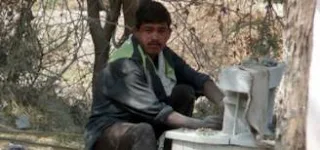 |
| An agate worker |
By Rajiv Shah
After failing to implement its own government resolution (GR) on paying Rs 1 lakh as compensation to those who die because of silicosis, a deadly lungs disease which is common among agate polishing units in Khambhat town and taluka of Gujarat, the Gujarat government is now planning a new one to "amend" its error, which allowed insurance companies to cover only those under group insurance scheme who die in an accident. While nobody in the government has any idea of what this new GR would be and whether it would be able remove the "technical hitch" which supposedly is the chief reason why the year-old GR could not be put into action, voluntary organisations working with the silicosis victims believe, the year was "lost" because of official indifference.
Jagdish Patel of the People's Training and Research Centre (PTRC), Vadadara, which campaigns for the cause of agate workers as well as those who suffer from other occupational health diseases, says, "The initial happiness over the possibility that the agate workers would get the compensation faded very quickly. When the GR was out, we were glad that finally the government had recognised silicosis as a deadly disease whose victims must be compensated. We even represented to government officials to raise the compensation amount to Rs 3 lakh. We also wanted to ensure that the GR was implemented with effect from June 25, 2007, as promised in it. We simultaneously stressed on setting up facilities which would ensure silicosis disease doesn't grip workers."
However, Patel, whose PTRC has been campaigning for the cause of agate workers for the last two decades, regrets, soon found out that his efforts had come to a nought. "We first approached the rural labour commissioner to get the forms for compensation, as we were told that we would get it there. However, on reaching there we found out that the rural labour commissionerate may have been made in charge of the whole compensation process, but it has taken objection to it on several counts.We verified this from the labour secretary's office in Sachivalaya, Gandhinagar, but were told the matter would be resolved soon", Patel wrote in PTRC's mouthpiece "Salamati".
In the meantime, PTRC volunteers showed the GR to former labour minister veteran socialist Sanat Mehta, who on reading it said it was "bogus". Mehta gave following reasons for it: First, it was insurance based. Secondly, if there was insurance then there had to a premium, too. However, the GR made no mention of the premium, hence it was not implementable. The volunteers were also told that even if the government decided to pay the premium, the insurance company would be unwilling to pay, coming up with some explanation or the other. There had been cases when group insurance schemes were floated but nobody got any compensation. Often, huge bribe is demanded in case someone tries to apply for it.
Following the May 2012 GR, several agate workers, suffering from silicosis, died. The PTRC approached the families of the victims, and collected necessary documents in order to get the compensation. "Thereafter, we went to the labour office of Khambhat to get necessary forms to fill them up and send them for as claims for compensation. We were told that the form would be available not in Khambhat but another town, Anand. We went to Anand, and there the official told us that the GR is not clear about how to pay compensation. The official showed us al communique which allegedly clarified what he wanted to say", Patel said.
This official communique, written on July 7, 2012, had been written by member-secretary, Gujarat Rural Labour Welfare Board. Addressed to joint secretary, state labour and employment department, the communique, referring to another GR dated June 25, 2007, said that group insurance scheme for compensation against death could be paid only if there was accidental death. "Natural death as a result of a disease or suicide is not covered under it. This, we were told had been clarified from the insurance company as well, it was clarified", Patel said.
All of it prompted Patel to write a letter to the state labour secretary on January 1, 2013, which said, to quote Patel, "it is most unfortunate that the Gujarat government prepares its GRs without doing any homework. This raises questions about working of the government. There cannot be a much bigger example of this than the way the government has shown indifference towards health care of the working people. We had widely propagated your GR of May 2012, stating that compensation would be paid against silicosis death victims. It is natural that the families of those who died had some expectations. You may please tell them what they should do now."
When approached Patel about the latest position, this is what he told www.counterview.net, "I talked to the senior secretary in labour department and they told me that they are in the process of publishing a new resolution. Since the resolution in place is not implementable, not a single victim has been paid any relief amount as decided by the Gujarat government."

Comments